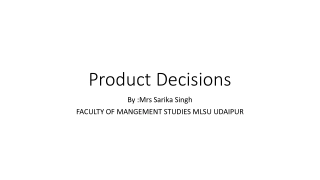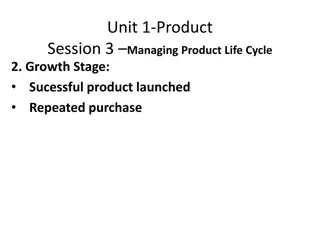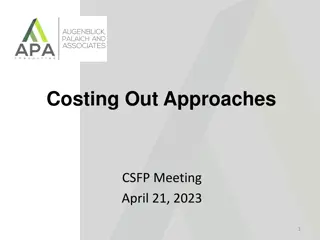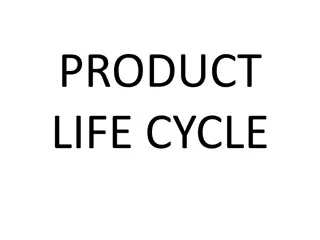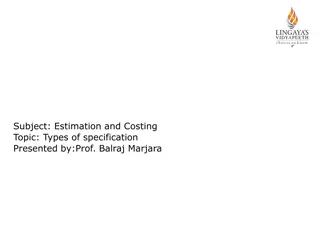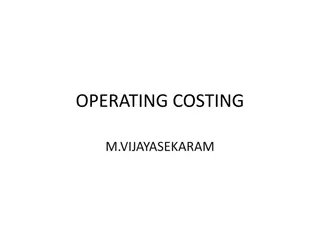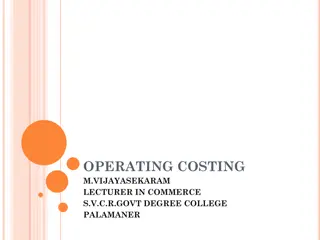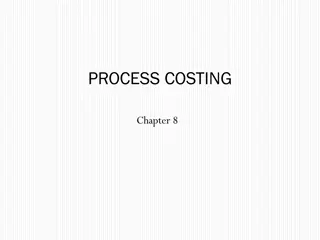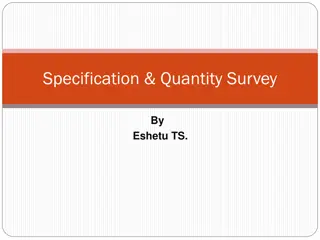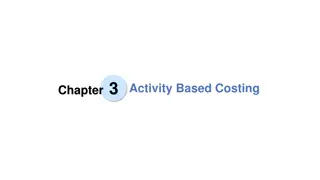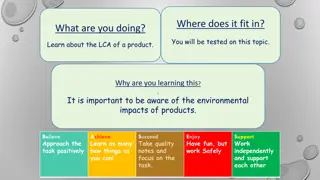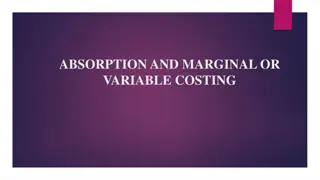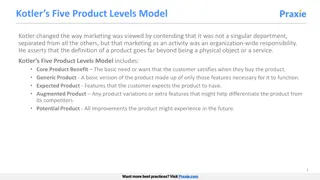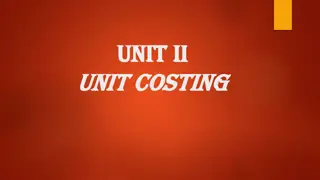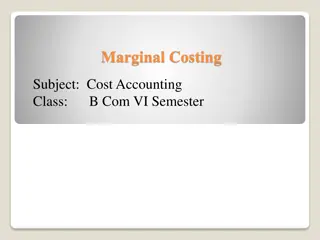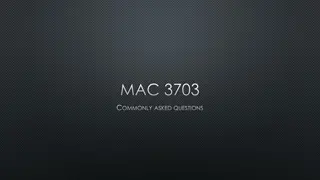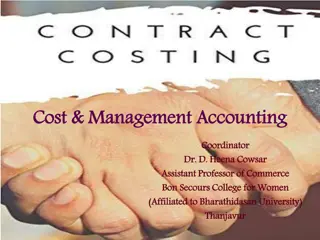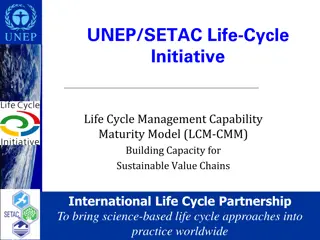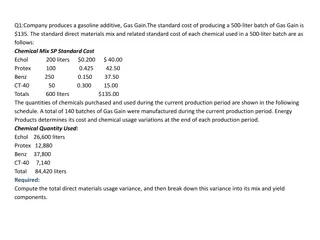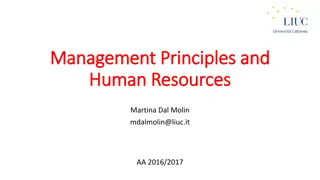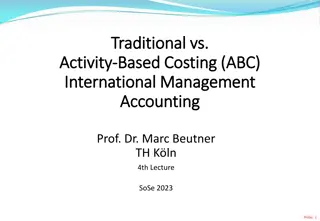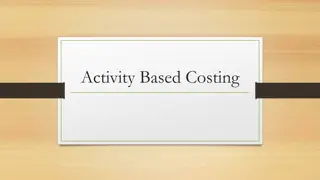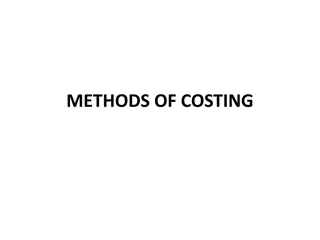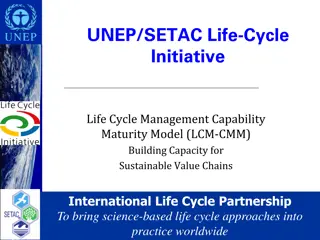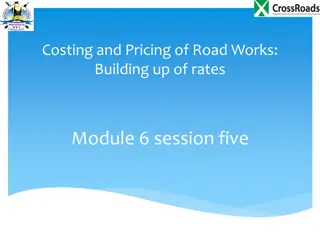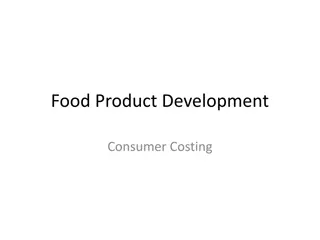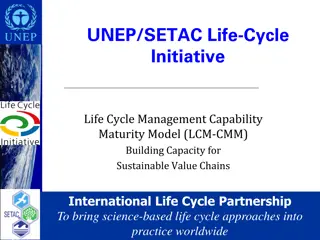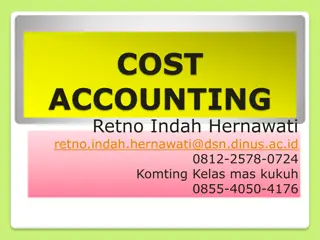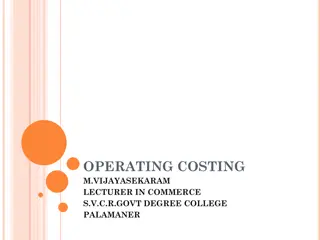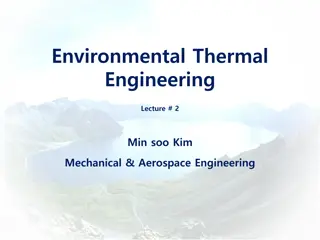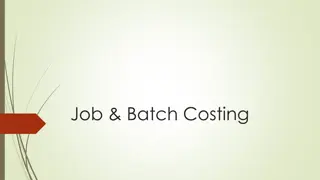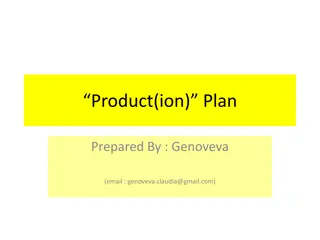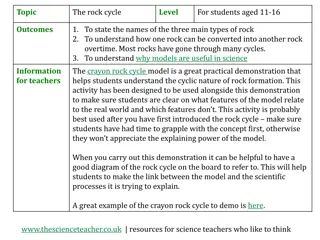Management Acounting & Control
Functions, scope, and limitations of management accounting, as well as cost accounting, break-even analysis, marginal costing, activity-based costing, budgeting, standard costing, responsibility centers, and current issues in management accounting.
21 views • 22 slides
Product Decisions
Explore the intricacies of product decisions, classifications, life cycle, and marketing mix as essential components in the world of marketing. Delve into the significance of product offering, classification models, and strategies to effectively manage product lines within your business. Gain insigh
1 views • 36 slides
Understanding Concepts of National Income in Economics
Explore the concepts of national income presented by Dr. Rashmi Pandey, covering key indicators such as Gross National Product (GNP), Gross Domestic Product (GDP), Net National Product (NNP), Net Domestic Product (NDP), Personal Income, Disposable Income, Per Capita Income, and Real Income. Gain ins
0 views • 22 slides
Managing Product Life Cycle: Growth, Maturity, Decline Stages
The product life cycle consists of the growth stage where a successful product sees repeated purchases and market expansion, the maturity stage where competition increases and strategies focus on maintaining market share, and the decline stage where sales decrease, requiring product repositioning. M
1 views • 21 slides
Regional Education Agreement Costing Tools Presentation
Presented by Bram Lerat, Khrystyna Orobets, and Ronda Ziakris for the Assembly of First Nations, this presentation discusses tools available for First Nations education costing studies, including inclusive education and transportation cost models. The session covers key elements of cost studies and
1 views • 26 slides
Costing Out Approaches
Costing out approaches and studies have been developed to ensure schools and districts have adequate resources to meet state education standards. Implementing these approaches involves professional judgment, evidence-based benchmarks, and data requirements. Using multiple approaches allows for trian
0 views • 12 slides
Understanding Product Life Cycle Costing: A Comprehensive Analysis
Lifecycle costing involves tracking cost records of assets throughout their entire lives, optimizing asset usage at minimal cost. Product lifecycle costing accumulates a product's costs from inception to disposal, with stages like Introduction, Growth, Maturity, and Decline. It helps assess profitab
4 views • 19 slides
Understanding the Product Life Cycle: Stages and Examples
The product life cycle (PLC) concept is essential for marketers to navigate through the stages of a product's market presence - from introduction to decline. Studying PLC with reference to demand-technology dynamics provides insights into competitive strategies. The main stages are research & develo
0 views • 31 slides
Understanding Different Types of Specifications in Estimation and Costing
In the field of estimation and costing, four main methods of specifying are used: Descriptive, Performance, Reference Standard, and Proprietary. Descriptive specifications provide detailed descriptions without using proprietary names, allowing for tight control over specified work. Performance speci
1 views • 9 slides
Understanding Operating Costing in Service Industries
Operating costing is a method utilized by service-oriented businesses to ascertain the costs of providing services. Industries such as transportation services, welfare services, utility suppliers, and municipal services find operating costing beneficial. The method involves classifying costs into th
0 views • 6 slides
Understanding Operating Costing in Business
Operating costing involves ascertaining costs for providing standardized services, aiding in efficiency, cost control, pricing decisions, and equipment maintenance. The objectives, unit of cost, and cost classifications are crucial components of this costing method.
1 views • 5 slides
Understanding Process Costing in Manufacturing Industries
Process costing is a widely used method in mass production industries like steel and chemicals. It involves accumulating costs process-wise for standardized products resulting from sequential operations. Essential characteristics include continuous production, standardized products, and handling nor
1 views • 18 slides
Project Cost Estimation: Methods and Factors
Project cost estimation involves valuing all monetary aspects necessary for planning, implementing, and monitoring a project. This includes various entrants such as preliminary investigation costs, design fees, construction expenses, and more. The purpose of cost estimation is to determine work volu
1 views • 44 slides
Understanding Absorption Costing and Overhead Absorption in Cost Accounting
Absorption costing is a method that includes direct costs and a fair share of production overhead costs in the cost of a product. Overhead absorption rate (OAR) is calculated using budgeted figures and can lead to over/under-absorption. Over-absorption occurs when absorbed overhead is more than actu
1 views • 23 slides
Understanding Activity-Based Costing (ABC) in Cost Management
Activity-Based Costing (ABC) is a strategic costing method that allocates overhead costs to products based on activities. It offers benefits such as accurate cost allocation and identifying cost drivers but also has challenges due to increased complexity and customization. ABC differs from tradition
1 views • 15 slides
Understanding the Environmental Impact of Products through Life Cycle Analysis
Explore the concept of Life Cycle Analysis (LCA) to understand how products impact the environment at different stages of their life cycle. By looking at what goes into making a product, how it is produced, transported, used, and disposed of, you can gain insights into its environmental footprint. E
0 views • 8 slides
Understanding Absorption and Marginal Costing in Accounting
Absorption costing, also known as full costing, encompasses all costs including fixed and variable related to production. It aids in determining income by considering direct costs and fixed factory overheads. Meanwhile, marginal costing focuses on only variable manufacturing costs and treats fixed f
0 views • 14 slides
Understanding the Calvin Cycle in Photosynthesis
The Calvin cycle, also known as the light-independent reactions, is a crucial part of photosynthesis where carbon dioxide is converted into glucose. This cycle occurs in the stroma of chloroplasts and utilizes ATP and NADPH from the light-dependent reactions to produce sugars for plants. It consists
5 views • 15 slides
Kotler's Five Product Levels Model and Competitive Strategies
Kotler's Five Product Levels Model redefines marketing as an organization-wide responsibility, focusing on Core Product Benefits, Generic Product, Expected Product, Augmented Product, and Potential Product. Strategies for each level aim at creating competitive differentiation. Implementation actions
1 views • 4 slides
Understanding Unit Costing in Industries
Unit costing is a method based on production units and is used in industries with continuous and uniform production of a single product or similar grades. The cost per unit is calculated by dividing the total cost incurred by the number of units produced. Various industries like collieries, quarries
2 views • 18 slides
Understanding Marginal Costing in Cost Accounting
Marginal Costing is a cost analysis technique that helps management control costs and make informed decisions. It involves dividing total costs into fixed and variable components, with fixed costs remaining constant and variable costs changing per unit of output. In Marginal Costing, only variable c
1 views • 7 slides
Modern Developments and Approaches in Business Environment
This covers topics such as modern manufacturing, costing techniques, continuous quality management, optimizing throughput, externally-focused management approaches, forecasting techniques, pricing decisions, project management, and more. Specific discussions include differences between cost accounti
0 views • 11 slides
Understanding Contract Costing in Management Accounting
Contract costing in management accounting refers to a specific type of job costing applied to long-term projects like construction. Contracts serve as cost centers executed under customer specifications, involving materials, wages, direct charges, sub-contracts, and completion certificates. Contract
0 views • 14 slides
Product Management Strategies and Assignment Overview
This content provides insights into various aspects of product management, including product mix, product line, product item, and product width and depth. It also outlines strategies for developing new products and modifying existing ones. Finally, it presents a creative assignment task for creating
2 views • 8 slides
Sustainable Value Chains and Life Cycle Management Capability
The UNEP/SETAC Life-Cycle Initiative focuses on building capacity for sustainable value chains through the Life Cycle Management Capability Maturity Model (LCM-CMM). It emphasizes implementing science-based life cycle approaches globally by transitioning from events to management systems, conducting
1 views • 12 slides
Costing and Variance Analysis in Manufacturing Processes
The content discusses various scenarios related to costing and variance analysis in manufacturing processes. It addresses topics such as direct materials usage variance, direct labor mix and yield variances, total direct labor efficiency variance, and standard costing system variances. The examples
0 views • 8 slides
Costing Techniques in Management Principles by Martina Dal Molin
Explore the different costing techniques such as Job Order Costing, Process Costing, and Operation Costing, as outlined by Martina Dal Molin for the Management Principles course. The Job Order Costing method focuses on allocating costs based on individual jobs or batches of products, emphasizing dir
3 views • 20 slides
Activity-Based Costing (ABC) in International Management: Methods and Analysis
Explore the application of Activity-Based Costing (ABC) in International Management, focusing on methods of assigning overheads, cost drivers, product and period costs, and value chain analysis. Dive into topics such as budgetary control systems, standard costing, flexible budgets, variance analysis
0 views • 48 slides
Understanding Activity-Based Costing for Cost Analysis
Activity-Based Costing (ABC) is a method used to allocate costs accurately by identifying activities that drive costs. It involves assigning costs to products based on the activities required to produce them. This approach provides a more precise reflection of the resources consumed by each product,
1 views • 8 slides
Introduction to Different Methods of Costing
Costing is a crucial technique for businesses to ascertain their costs, regardless of being in manufacturing, merchandizing, or service provision. This article explores various methods of costing such as job order costing, batch costing, contract costing, process costing, and service costing. Job or
0 views • 53 slides
Life Cycle Management for Sustainable Value Chains: Building Capacity and Promoting Innovation
This content delves into the Life Cycle Management Capability Maturity Model (LCM-CMM) aimed at enhancing sustainable value chains globally. It emphasizes the importance of bringing science-based life cycle approaches into practical implementation to address global issues, international standards, c
1 views • 11 slides
Understanding Costing and Pricing of Road Works
Exploring the process of costing and pricing road works, including factors to consider, building up rates, and the importance of accurate cost estimation. Contractors cost road works to estimate resources, set competitive prices, and ensure profitability. Various approaches to costing works and key
0 views • 24 slides
Understanding Food Product Development and Costing
Explore the intricacies of cost management in food product development, including factors affecting costing, ways to reduce cost prices, and the impact on profit margins. Learn about key components of costing such as raw materials, testing, packaging, transportation, and marketing. Discover the diff
0 views • 12 slides
Sustainable Value Chains and Business Context in Life Cycle Management
The UNEP/SETAC Life-Cycle Initiative focuses on building capacity for sustainable value chains worldwide through the Life Cycle Management Capability Maturity Model. Understanding the competitive, environmental, and business contexts is crucial for implementing science-based life cycle approaches ef
0 views • 15 slides
Understanding Cost Accounting Principles and Concepts
Explore the fundamentals of cost accounting through the 14th edition by Carter. Learn about cost concepts, production costing, job order costing, process costing, activity-based accounting, joint costing, and standard costing. Dive into assessments, activities, and classifications of costs related t
0 views • 28 slides
Understanding Operating Costing in Service Industry
Operating costing, also known as service costing, is a method of determining costs for standardized services provided by organizations. It focuses on service provision rather than manufacturing goods. Key features include uniform service delivery, classification of costs into fixed and variable, and
0 views • 6 slides
Fundamentals of Environmental Thermal Engineering in Mechanical & Aerospace Engineering
Explore the key concepts of environmental thermal engineering in Mechanical & Aerospace Engineering, covering topics such as the Carnot cycle, actual vapor-compression cycle, principles of the vapor-compression cycle, Carnot heat engine, refrigeration cycle, and coefficient of performance. Understan
0 views • 51 slides
Understanding Job and Batch Costing in Industries
Job and Batch Costing are methods used in industries to ascertain the cost of specific jobs or batches separately. Job Costing is ideal for dissimilar or non-repetitive industries, while Batch Costing treats each batch as a cost unit. Both methods help in cost analysis, profitability assessment, and
0 views • 7 slides
Understanding Product Classification and Diversification Strategies
Explore the classification of products into tangible goods and intangible services, along with consumer product categories like convenience, shopping, and industrial products. Learn about product diversification with examples from companies like Unilever. Discover the product life cycle and unique p
0 views • 9 slides
Exploring the Rock Cycle Using the Crayon Rock Cycle Model
This educational resource focuses on teaching students aged 11-16 about the rock cycle, including the types of rocks, how rocks transform over time, and the importance of models in science. It introduces the crayon rock cycle model as a hands-on demonstration to help students grasp the cyclic nature
0 views • 4 slides

